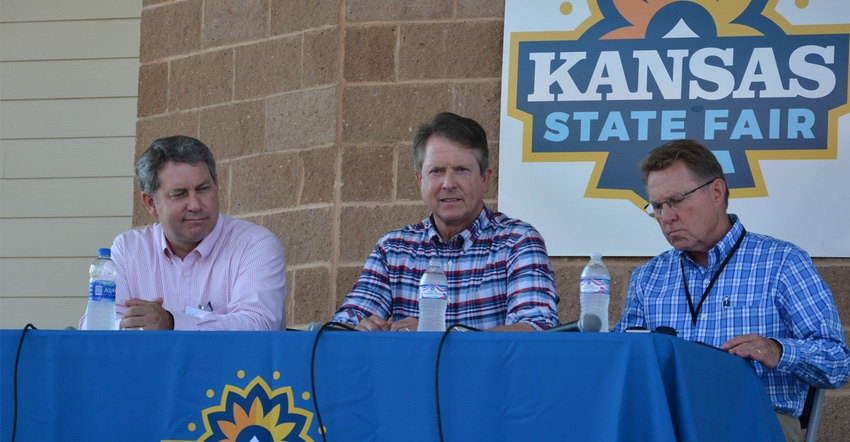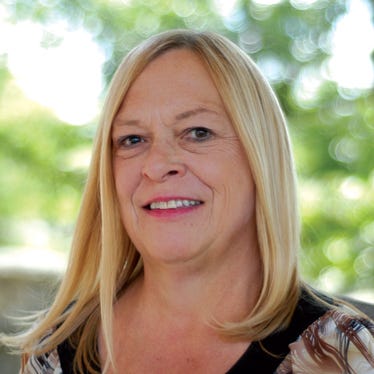
International trade was front and center at Legislator’s Day at the Kansas State Fair on Sept. 7, with USTR Chief Ag Negotiator and Kansas native Big First Rep. Roger Marshall and Kansas Secretary of Agriculture Mike Beam taking the stage for the annual WIBW-Radio Ag Issues Forum — this year the topic being one on almost every farmer’s mind: trade and markets.
Heavy emphasis was placed on the importance of getting the updated NAFTA, the U.S.-Mexico-Canada Agreement ratified in Congress. Because the legislation that would need to be passed to implement the agreement involves appropriation, the law requires the ratification process to begin in the House of Representatives.
Even as Congress has been on summer recess, talks have been continuing to resolve any issues to passage.
“Getting this ratified sends an important message to the world,” Doud told fairgoers. “This tells other countries that we’re serious about getting it done. If we can’t even get an agreement with our two biggest trading partners, we don’t look good.”
The U.S. had $145 billion in agricultural exports last year. Canada and Mexico accounted for $44 billion of that, which China accounted for $20 billion in U.S. ag products, $13 billion of that in soybeans alone. In recent weeks, China has halted all purchases of U.S. ag products in retaliation for new tariffs on goods coming into the U.S.
Doud contended that even the prior volume of Chinese purchases was not nearly enough. He said China imports about $124 billion in ag products annually, and $20 billion from U.S. just “isn’t going to cut it.”
“They buy almost no beef, pork or poultry,” he said. “Their imports of those meats last year were over $1 billion. The U.S. share of that was just $77 million.”
Doud said that it is not just tariffs that are the problem but unfair trade barriers surrounding technology.
“We keep asking, ‘How do you expect to have food for 9 billion people by 2050?’ The answer is technology and we are not backing down from that,” he said. “Now, we’ve got countries talking about banning Roundup. I said if you ban new, safer technologies, farmers will have to go back to using old technology that is worse for the environment. The answer I get is, ‘We’re banning those two.’ I had one minister actually say they were only allowing milk, beer and vinegar for pesticides. And she meant it.”
He said the office of USTR is working to get wheat into Brazil — a battle that has been ongoing for 25 years.
“I hate to have to counsel patience, but the reality is it’s very rare for a trade agreement to be undone or revised once it is in place,” Doud said. “We have to look at this as our one shot at it. And we’ve got to get it right.”
'The president has promised to fix it'
In his opening remarks, state Rep. Roger Marshall assured the audience that President Donald Trump is working for them.
“The last time I was in the Oval Office with the president, we were planning to talk about legislation to replace Obamacare. But as soon as I walked in, he asked, ‘How are your farmers doing?’ I told him I have to be honest, they’re hurting. And we spent the next 30 minutes talking agriculture, and I was so impressed with his depth of knowledge and his commitment to farmers. He told me to thank you for being great patriots. Right now, we need to get NAFTA 2.0 approved.”
He also touched briefly on the refinery waivers to the Renewable Fuel Standard that have been a sticking point with corn growers.
“The president has promised to fix it,” he said. “He assured me he has a great solution that will be rolled out soon. He’s going to give us something huge.”
Mike Beam, state agriculture secretary, said international trade is the key to increasing markets for Kansas ag products. He reminded the audience that even though there was lot of debate over whether NAFTA should have ever passed originally, it has been a success story for Kansas farmers.
“We have quadrupled trade with Canada and Mexico,” Beam said. “It has been a big winner for Kansas and there is clear support for the new USMCA. Ag trade is very significant. We really want to make it happen.”
In answering questions from the audience, Doud said that there is agreement in principle with Japan and negotiators are “dotting the i’s and crossing the t’s to get all the details hammered out.” He said other immediate targets for bilateral deals are the United Kingdom, South Korea and the European Union.
On the question of when an infrastructure package might be introduced, Marshall said the biggest need in rural America today is high-speed internet. He said it is proving difficult to get big issues addressed in the current Congress, blaming the Democrats’ insistence on investigations into Russian meddling in the 2016 elections and more recently into obstruction of justice and financial corruption.
Beam said he is worried about Kansas farmers being left behind in opportunities for embracing precision agriculture.
Doud said the export situation is “precarious.” He pointed out that 25% of all pork production is exported.
“What would it do to domestic prices if all the product were suddenly on the market here?” he asked. That’s why getting not just tariffs but other trade barriers resolved with China is so important, he said.
Doud emphasized that the U.S. has to stand its ground on biotechnology and make trading partners understand that food produced in the U.S, is the safest anywhere in world.
“We have a robust regulatory system and a network of inspectors. The robustness of our system is something we can use to sell consumers abroad on the safety of our food,” he said. “That will be the key to getting acceptance of biotechnology. The USMCA is the gold standard for the language discussing biotech.”
Doud encouraged ag producers to “stay in lockstep” on the key issues.
About the Author(s)
You May Also Like






